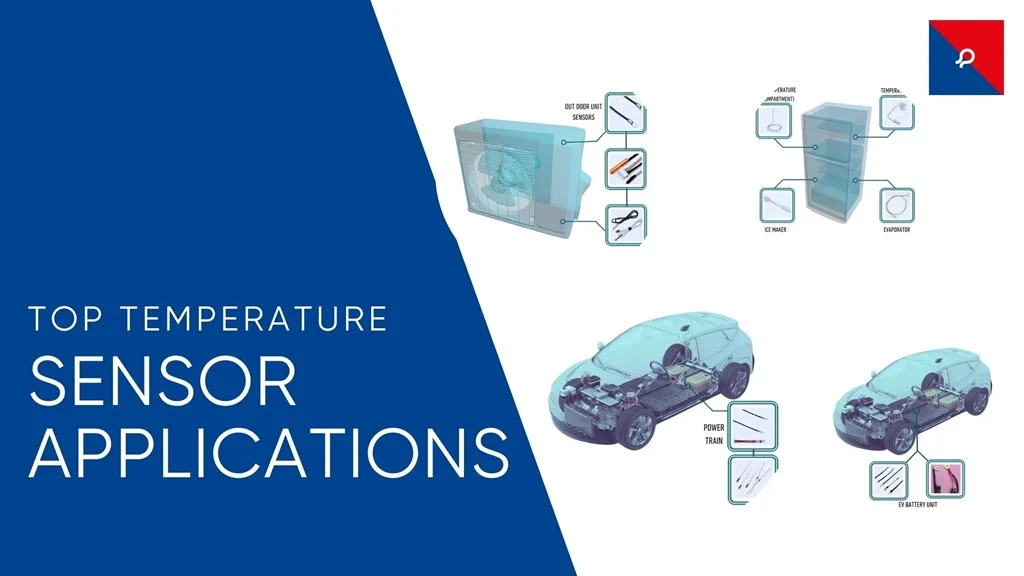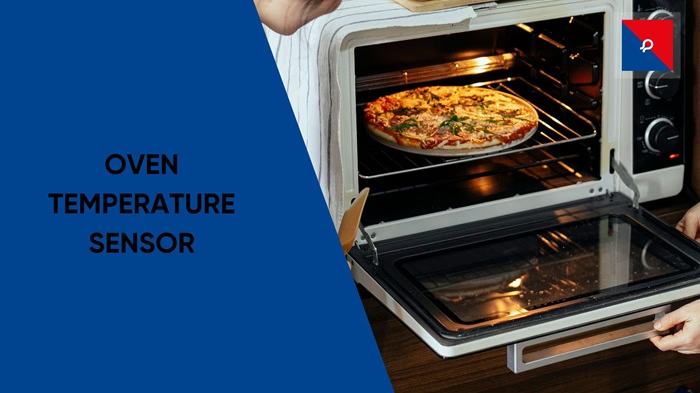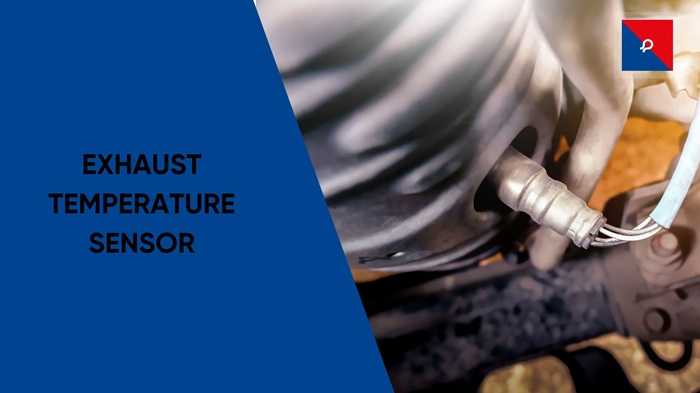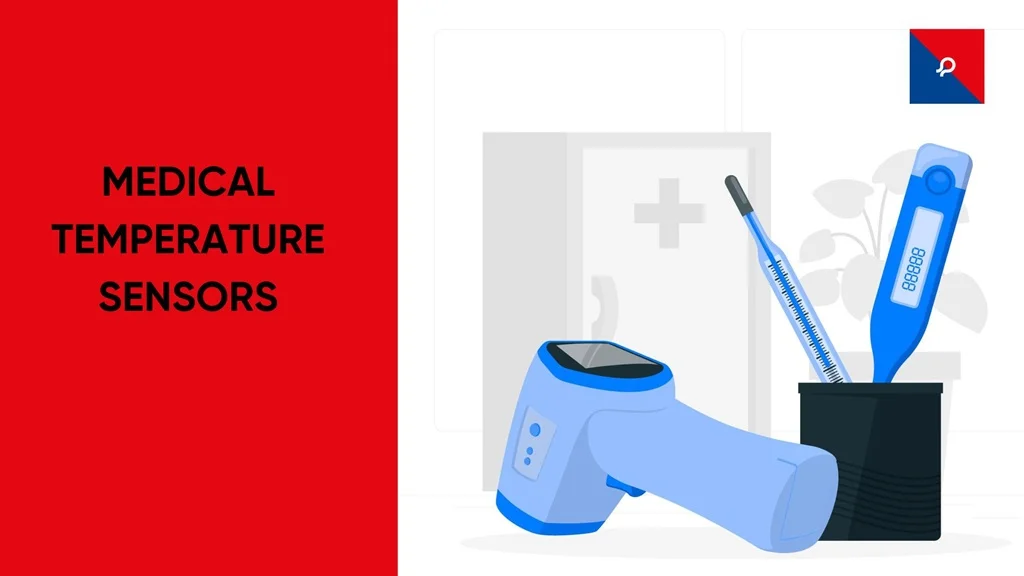
Today, temperature sensors are indispensable components of modern technology integrated for precise monitoring and control across industries. These measure temperature and convert it into a format understandable by systems and humans. Progressive advances in technology keep improving the compactness reliability and efficiency of temperature sensors. This article brings out the diverse applications of temperature sensors and emphasizes their importance and functional versatility. It would also focus on the temperature sensors offered by JR Sensors, showcasing their significance in the industry.
Introduction to Temperature Sensor Applications
Temperature sensors are used in the sectors to ensure safety, optimize processes, and keep the quality of products. With temperature sensors, even daily-use devices like air conditioners are included in more complex industrial systems. The main two categories of temperature sensors are:
- Contact Sensors, which acquire temperature measurements in contact with the system (so-called thermocouples, RTDs).
- Non-contact Sensors, take advantage of infrared radiation to measure temperature from a distance (IR sensors).
Every type of object has a place and application suitability according to the head office and other demand-related aspects.
Applications of Temperature Sensors
Supposedly, temperature sensors are applied to various fields due to their versatile nature and high precision. Below are the main applications of temperature sensors:
1. Consumer Electronics
- Air Conditioners: Cooling is controlled in accordance with the room temperature by temperature sensors.
- Refrigerators: They observe the temperature of the inside to be regulated for the preservation of the food.
- Cell Phones: These sensors prevent the temperature from rising higher than usual during high-intensity jobs.
2. Automobile Industry
- Monitoring Engine Temperature: Makes use of sensors to ensure that engines operate within the safe temperature limit.
- Battery Management Systems: The use of sensors to measure battery temperatures is essential in an electric vehicle.
- Thermal Control Systems: Sensors support the cabin within a suitable temperature range.
3. Industrial Automation
- Process Control: Indicate the application of temperature sensors for controlling processes in industry manufacture.
- Maintenance of Equipment: The devices have the capability of sampling to prevent failures due to overheating.
- HVAC: Such systems of storage of heat, ventilation, and heating for industrial use rely on temperature sensors.
4. Health Field
- Patient monitoring: Temperature sensors in thermometers and in wearable devices can measure patients' body temperatures.
- Laboratory Equipment: Accurate medical results are obtained by controlling the temperature in incubators and storage systems.
- Cryogenics: Through very low temperatures, their sensors are effective in the storage of biological materials.
5. Food and Beverage Industry
- Cooking and Baking: Send out reports during various ranges of temperatures that ensure the consistent quality of food.
- Cold Storage: Monitoring ensures food security and extension longevity.
- Beverage Processing: Regulates born temperature during brew and distillation.
6. Aerospace and Defense
- Engine Monitoring: The sensor measures the temperatures in the engine jet and spacecraft.
- Environmental Monitoring: They supply the means to maintain viable operating conditions for equipment working under extreme environments.
7. Renewable Energy
- Solar Panels: Sensors measure the temperature of the panel and are then set to achieve optimum energy output.
- Wind Turbines: Temperature sensors are safeguarding against overheating of components.
8. Scientific Research
- Environmental Studies: Sensor measures temperatures in experiments and studies.
- Material Testing: Such as testing the behavior of materials under certain temperature conditions.
Other Temperature Sensor Applications Include
While temperature sensors are widely used in consumer electronics, automobiles, healthcare, and industrial automation, there are many other lesser-known but equally critical temperature sensing applications across various domains:
- Textile Industry: Temperature sensors ensure uniform heat in dyeing and drying processes, maintaining fabric quality.
- Pharmaceutical Manufacturing: Precise temperature measurement applications help maintain consistency in drug production, packaging, and storage.
- Smart Homes: From programmable thermostats to fire alarms, temperature sensors ensure safety, energy efficiency, and convenience in modern homes.
- Data Centers: Temperature sensors are critical in monitoring and maintaining ideal environmental conditions for servers and networking hardware.
- Marine Systems: In ships and underwater systems, temperature sensors provide real-time thermal monitoring for engines and power systems.
These diverse temperature sensor uses show how integral they are in protecting assets, enhancing performance, and promoting sustainability. For high-stakes applications, it's crucial to partner with reliable heat sensor suppliers for industrial applications like JR Sensors.
Temperature Range Table
Understanding the operational range of temperature sensing application products helps select the right sensor for your needs. Here’s a general overview of commonly used temperature sensor types and their temperature measurement range:
| Sensor Type | Temperature Range | Applications |
| Thermocouple | -200°C to +1800°C | Industrial processes, kilns, engines, aerospace |
| RTD (Resistance Temp Detector) | -50°C to +500°C | Laboratory, healthcare, precision electronics |
| NTC Thermistor | -55°C to +150°C | Consumer electronics, HVAC, automotive |
| Infrared (IR) Sensor | -70°C to +1000°C (non-contact) | Food safety, medical diagnostics, motion & thermal monitoring |
| Semiconductor Sensor | -55°C to +150°C | PCs, battery packs, IoT and wearable devices |
Each sensor type has its niche in temperature monitoring and control systems, making it vital to choose based on the exact temperature transducer application you're targeting.
Benefits of Temperature Sensors
The significance of temperature sensors for industrial applications and beyond lies in their precision, safety, and automation-enabling abilities. Let’s explore the key benefits of temperature sensors:
- Enhanced Safety
Used as temperature safety measure components in critical equipment, they prevent overheating and fire hazards in everything from factories to homes.
- Optimized Performance
In motors, HVAC systems, and temperature measurement devices for industrial applications, sensors optimize system operations, reducing wear and energy use.
- Process Control & Automation
Industrial sensors help monitor and regulate temperature in real time, improving manufacturing efficiency and reducing waste.
- Energy Efficiency
Smart sensors regulate heating and cooling in buildings, contributing to significant energy savings.
- Versatility
From temperature sensors for beverage industry to temperature sensors for life sciences applications, their wide adaptability supports industry-specific demands.
- Non-Invasive Measurement
Infrared temperature sensor applications allow safe, hygienic, and quick thermal readings, especially in healthcare and food sectors.
- Scalability
Ideal for both large-scale manufacturing systems and compact devices like smartphones and wearables.
Temperature sensors are among the top 5 applications of sensors in the modern age, used not just for monitoring but also for predictive maintenance, automation, and innovation across sectors.
JR Sensors: Advanced Temperature Solutions
High-quality temperature sensors for all possible applications are manufactured at JR Sensors. These products are known for their reliability, precision, and durability while catering to various industries:
1. Industrial Applications
Robust industrial-grade thermocouples and resistance temperature detectors (RTDs) are available from JR Sensors for industrial automation and process control. The sensors come with accurate measurements in the high-pressure and high-temperature applications.
2. Automotive Solutions
Monitor engine and battery temperature with these automotive sensors to provide maximum performance and safety. These sensors are compact, effective, and resistant to harsh conditions.
3. Medical Equipment
JR Sensors is focused on developing precise thermometers and temperature probes for healthcare-based applications. This type of equipment is a must-have for patient observation and laboratory apparatus.
4. Customized Solutions
Tailored temperature sensors are manufactured by JR Sensors that specifically meet customers' individual needs yet still make sure that they are suitable for their unique applications as well as optimum performance.
Advantages of JR Sensors
- Accuracy: Precision sensors owing to reliable readings High Overall.
- Resistance: Severe conditions can be resisted.
- Versatility: Widespread applications across industries.
- Customizability: Custom solutions as per specific industry needs.
Conclusion
Temperature sensors have a firm foothold in the present-day world, from consumer electronics to the aerospace level. They bring about safety, process optimizations, and efficiency improvements. JR Sensors, delivers advanced and reliable solutions, suiting diverse needs in various industries.
However, from healthcare precision to robust performance in industrial automation, temperature-sensing devices are critical for smooth operation and consistent results.
Frequently Asked Questions
1. What are the common types of temperature sensors?
2. How are temperature sensors used in the automotive industry?
3. What makes JR Sensors stand out in the market?
4. Are temperature sensors used in renewable energy systems?
5. Can JR Sensors provide customized solutions for niche applications?

Burnt Biscuits? Blame the Sensor – The Hot Truth About Your Oven’s Temperature Troubles
If your oven’s cooking like it’s got a mind of its own, your temperature sensor might be the silent saboteur. From half-baked casseroles to scorched cookies, we break down how this little sensor works, why it matters, and how to fix it—without losing your cool (or your dinner). A fun, practical guide that’s just as useful as it is digestible.

Hot Stuff: Why Your Engine Can’t Live Without an Exhaust Temperature Sensor
Think exhaust sensors are just another car part? Think again. These tiny guardians track fiery exhaust temps, protect turbos, keep emissions in check—and even help you pass that dreaded test. Dive into the witty, down-to-earth guide on how EGT sensors silently save your engine (and your wallet) every day. Bonus: You’ll sound like a car guru by the end.

Tiny Tech, Big Impact: Inside the World of Medical Temperature Sensors
Discover how medical temperature sensors work, why they're crucial in healthcare, and how health sensors are transforming modern medical diagnostics. From wearable tech to high-precision devices, learn about the different types of temperature sensor medical devices used today.